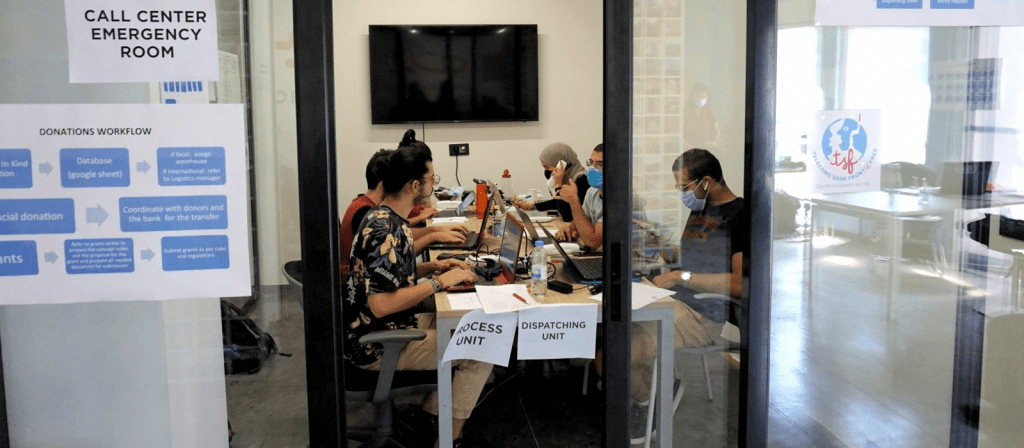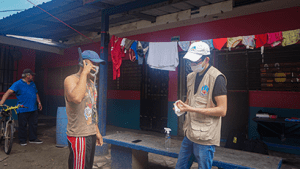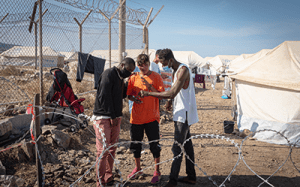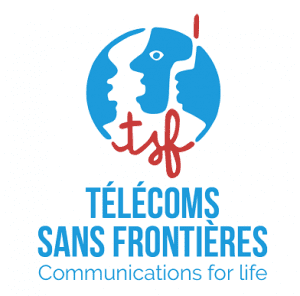
Social distancing. Confinement. Quarantines. Border closings. The need to limit the diffusion of COVID-19 has led to the limitation of travel and all proximity to others. More than ever, the most vulnerable continue to require our assistance. Télécoms Sans Frontières (TSF) has worked to ensure both the continuity of all ongoing projects from a distance, as well as the initiation of new actions. Its teams monitor humanitarian crises and natural disasters around the world to ensure they can deploy in-person whenever possible, or support remotely when COVID-19 restrictions don’t allow travel.
“We managed to adapt well to the restrictions,” explains Jean-François Cazenave, president of Télécoms Sans Frontières. “The use of technical tools that allow us to manage our actions remotely has always been an essential component of our work. This allows us to more effectively follow up and quickly resolve any technical problem. So, during this health crisis, we continue 100% to provide support to the most disadvantaged.”
Deploying During a Global Pandemic
Throughout the year, TSF has been able to deploy to Lebanon, Greece, and Honduras. Following the explosion in Beirut on 4 August, TSF was able to conduct a telecom assessment in collaboration with the United Nations Disaster Assessment and Coordination (UNDAC) teams. The TSF team then set up a call center in partnership with the local NGO Live Love Lebanon in order to link victims of the explosion with other NGOs that are able to provide them with assistance in multiple sectors like food, health, and reconstruction of their lost or damaged property.
 In Greece, TSF mobilized in the aftermath of the fire which destroyed Moria, the largest refugee camp in Europe, established in 2015 on the island of Lesvos. The team set up Wi-Fi coverage in the new camp of Kara Tepe, built in a few short weeks to accommodate the asylum seekers who suddenly found themselves without shelter. In the first month of operations, almost 2,500 unique devices were registered on the connection.
In Greece, TSF mobilized in the aftermath of the fire which destroyed Moria, the largest refugee camp in Europe, established in 2015 on the island of Lesvos. The team set up Wi-Fi coverage in the new camp of Kara Tepe, built in a few short weeks to accommodate the asylum seekers who suddenly found themselves without shelter. In the first month of operations, almost 2,500 unique devices were registered on the connection.
Finally, in Honduras, TSF’s regional team from the Americas and the Caribbean deployed in collaboration with UNDAC to assess the state of the telecom network in San Pedro Sula, where many shelters were installed for the people affected by the consequences of Eta and Iota, two successive powerful hurricanes. Although local networks were partly operational, the TSF team provided free calls and free Wi-Fi access in the emergency shelters to allow the local population to remain in contact with their relatives.
Helping Vulnerable Populations Remotely
When deployments were not possible due to COVID-19 restrictions, Télécoms Sans Frontières remained able to provide its support remotely, be it for the continuation of its existing recovery activities or for new relief operations. For relief operations, TSF can build on the good relationships with government agencies developed in over 20 years of humanitarian activity, and quickly send satellite equipment as well as provide remote assistance for their installation, use, management, and maintenance.
 “When TSF engages in taking over the provision of satellite communications, and even more so in the current remote working situation, we don’t just donate phones, antennas, and credit,” said Clément Bruguera, emergency and ICT coordinator at Télécoms Sans Frontières. “The organizations with which we engage also benefit from all our know-how in the field of Internet communications by satellite. This obviously involves advice on use but also prioritizing communications that require it and filtering inappropriate content or applications.”
“When TSF engages in taking over the provision of satellite communications, and even more so in the current remote working situation, we don’t just donate phones, antennas, and credit,” said Clément Bruguera, emergency and ICT coordinator at Télécoms Sans Frontières. “The organizations with which we engage also benefit from all our know-how in the field of Internet communications by satellite. This obviously involves advice on use but also prioritizing communications that require it and filtering inappropriate content or applications.”
For the continuation of recovery activities, the use of tailored technological solutions allowed TSF to continue its support without interruptions. This has been the case in Mexico, where it continued to provide vital information to migrants and refugees hosted in shelters throughout the country through its digital information diffusion system, which can be managed 100% remotely. Similarly, in Turkey, TSF’s educational project aimed at teaching digital skills to Syrian refugee children has been quickly adapted to remote learning through the use of an online platform developed by its technical teams, the use of WhatsApp groups, and daily videoconferences. Tablets and Internet data packages were also provided to families who couldn’t afford to have these tools at home.
The world continues to face uncertain times. Télécoms Sans Frontières remains committed to protecting the world’s most disadvantaged populations, whose vulnerability has been significantly increased by the global pandemic, and helping them regain control of their lives.
About Télécoms Sans Frontières
Télécoms Sans Frontières (TSF) was founded in 1998 as the world’s first NGO focusing on emergency-response technologies. During humanitarian crises we give affected people the possibility to contact their loved ones and begin to regain control of their lives, as well as we build rapid-response communications centres for local and international responders. They were recognized by PTC with a 2018 Innovation Award.


 Monique Lanne-Petit
Monique Lanne-Petit


